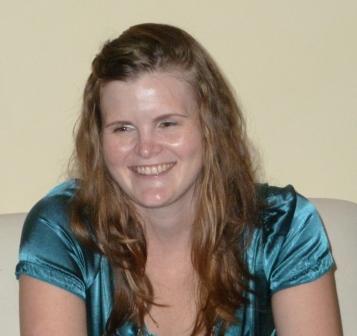
Linguists are used to studying South Africa as a multilingual society, but what about people in our country who only speak one language? Do they feel inferior to others, or aren't they bothered? Are they guilty that they don't know other languages, or do they think that their language is the only one that counts? Jacqui Carlyle, a MA student in the Rhodes Linguistics department wants to find out the answers to these questions. On Monday 30 May she presented the research proposal for her Master's thesis at a special Departmental Research Seminar.
Jacqui plans to focus her research on suburban Durban, one of the few places in South Africa where there are quite a few people who speak only one language in the course of their daily lives. The city has the greatest concentration of English-speakers in the country, and because English is the dominant language in official contexts there, English-speakers in Durban can get by without ever having to speak another language. However, English-speakers are still far outnumbered by the city's isiZulu-speaking population. Up till now, all research on monolingualism has been done in places where the language of power is also the language spoken by the majority, which makes Jacqui's research unique.
Monolingualism, according to Jacqui's research proposal, exists on a continuum from those who only know a few words in a second language to people who have studied a second language, yet are not able to carry out a casual conversation in that language. Jacqui plans to survey 150 teenagers from two schools in a middle-income suburb of Durban who fit this definition as a starting point for this research. These school pupils will all be 'born-frees', who have lived their entire lives in the post-apartheid era in which multilingualism has been highly valued.
In her survey, she will ask basic questions about speakers' attitudes towards various languages, including English. This survey will be followed up with another questionnaire in which she will present participants with a variety of short descriptions of people or situations which combine a number of the factors she is investigating. She will ask them questions like “How would you react in this situation?” and “Why do you think this person responded in this way?” Based on this second questionnaire, she will conduct in-depth interviews with 10-12% of her survey participants, aiming to find out the stories behind their language use and perceptions of other languages.
Jacqui's Master's research will build on similar research which she did on a smaller scale at Honours level, focusing on monolingual students at the University of KwaZulu-Natal. She found that many of her participants viewed their monolingualism as “inevitable”, not something to be proud of, but not a situation that they could get out of easily either. It will be interesting to see if the same attitude is found among the high school pupils Jacqui will survey, or whether her survey will reveal new meanings of monolingualism.
